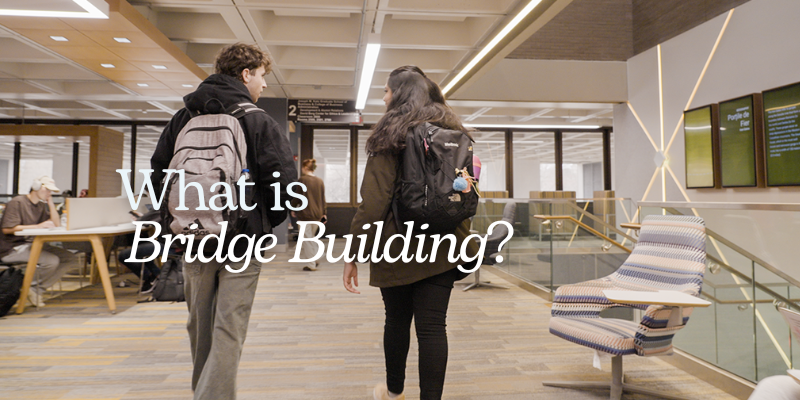What Does Building Bridges Mean?

What does it mean to “build bridges” through civil discourse—and why is it important for colleges campuses? At the University of Pittsburgh, students, faculty, and staff share what building bridges means to them and civil discourse can foster connection, understanding, and a stronger campus community.
To see more of what they had to say watch Real Talk: Across Campus, Across Divides.
Alexander Weaver, Student
Bridge building is something I’m very passionate about. Coming from a fairly homogenous town, Pitt’s diversity opened me up to new experiences and perspectives. It’s about creating space for civil dialogue, empathy, and understanding—especially when it’s hard.
Samantha Balbier, Executive Director of the Institute of Politics
Bridge building is essential in our society. We live in a very polarized world, and we often make assumptions about each other without knowing the experiences, culture, or background that people bring to the table. As a bridge builder, it’s our job to help people see beyond assumptions and focus on problem solving.
Joan Gabel, Chancellor
Bridge building means a lot to me because there’s often an assumption that being divided is a bad thing. The word “division” itself has a negative connotation, when in fact, division can simply mean difference—and difference is a good thing.
The way we overcome the negative association with being divided is by building bridges. And building bridges doesn’t mean you change your mind. It means you appreciate that people can be on both sides of the bridge, and that’s okay—in fact, it’s often a good thing.
When we meet—at least in understanding each other’s point of view—and are able to express why we may or may not agree, we deepen our understanding of why we stand where we do. That makes us more educated, more kind, and better equipped to function as a society.
Josie Rush, Teaching Consultant
Whether we’re students or not, people sometimes assume where there’s disagreement, there’s conflict. Then, they think that’s the end of this encounter and this process. However, bridge building through practicing discourse and dialogue and having difficult conversations is about finding connection nonetheless. When we cultivate a greater understanding of other positions, we can develop a more realistic solution to problems or at least a better approach to what’s happening in the world.
Joel Brady, Manager for the Center for Mentoring, and a Part-Time Faculty Member in the Department of Religious Studies
It’s much easier and quicker to destroy relationships than to construct and foster productive relationships. And that hard work involves getting people into a room with one another and having some sense of investment. You have to think about motivation–are students motivated to communicate across difference? And that means finding mutual, common interests. It may mean tackling assumptions that they may have, including maybe misplaced assumptions about their interlocutors. It means articulating common goals, whether those are very high-minded goals for humanity, society or possibly more localized goals.
Students experience real trauma from failed attempts at dialogue. Educational research on motivation shows that the more experiences people have of failure, of putting forth an effort, the less motivated they are. So you have to create small opportunities for success where they can see that, if I put a little bit of effort into this communication, I might actually get somewhere. And maybe I won’t get burned like I thought I might and end up somewhere productive.
